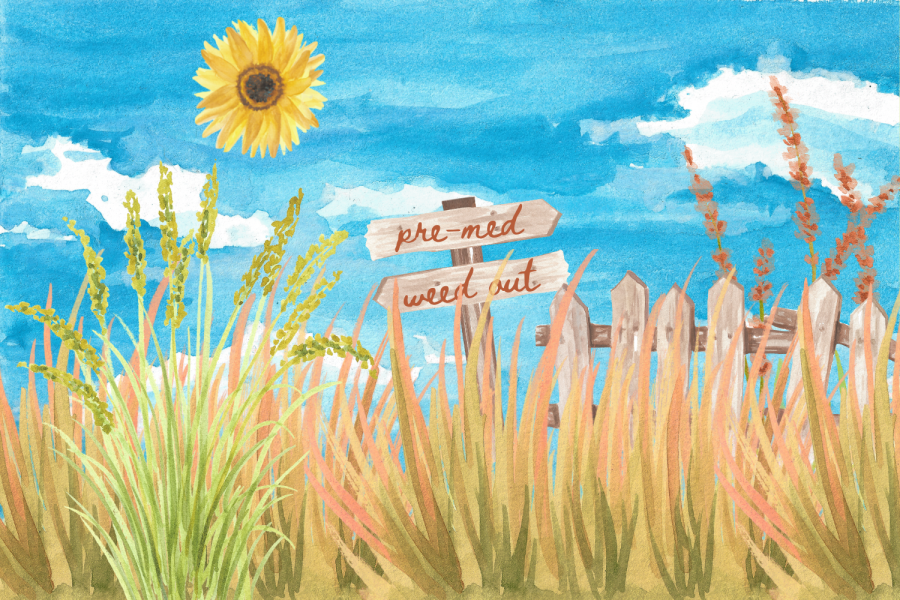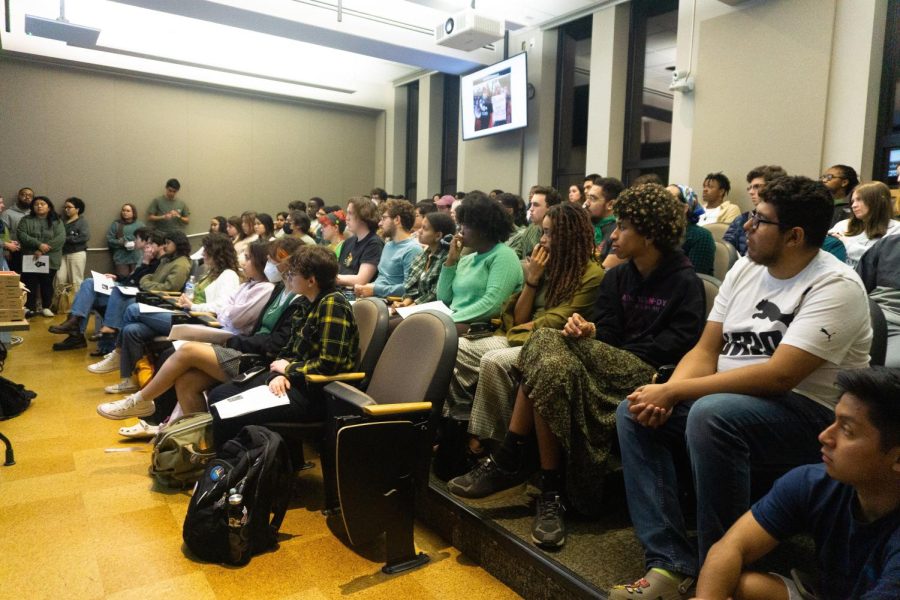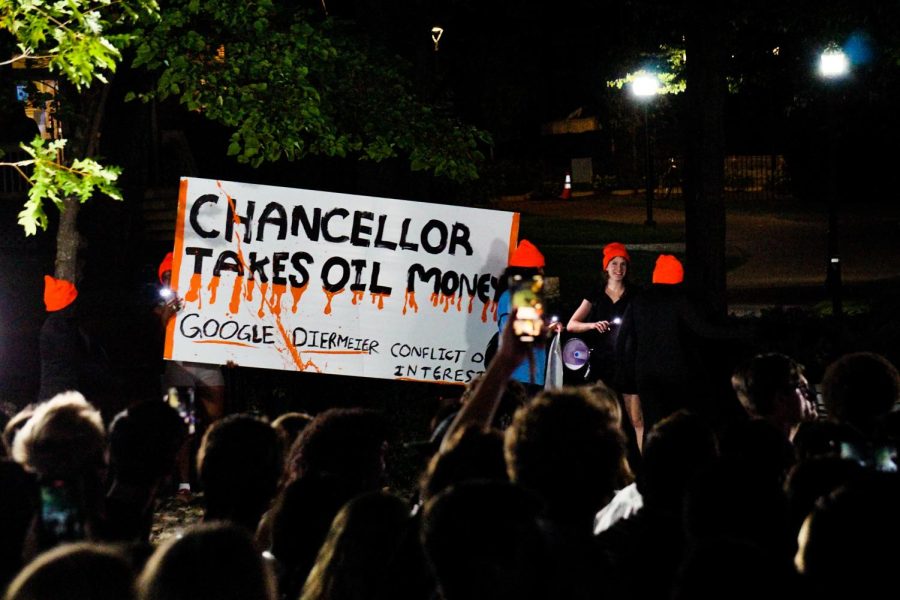According to a July 30 Degree Choices study, Vanderbilt ranked 30 out of 38 universities in overall progressivity, scoring 56.3 out of 100. This score puts Vanderbilt in the bottom 25 percent of the universities in the study, which were largely chosen using the U.S. News Best National Universities list, according to Chloe Thompson, a Degree Choices representative.
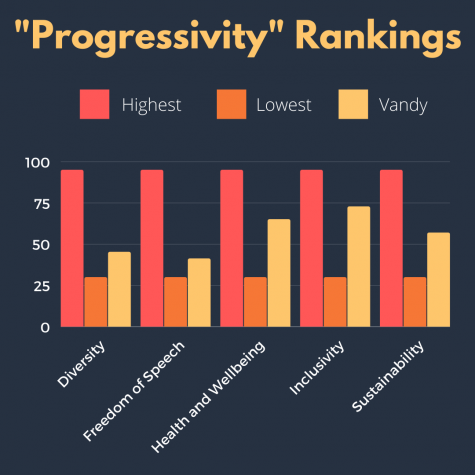
Overall scores were calculated by averaging individual ratings of five different “progressive” values, including diversity, inclusivity, health and well-being, sustainability and freedom of speech. The diversity, inclusivity and sustainability metrics held 50 percent more weight than the freedom of speech and health and well-being metrics when calculating progressivity. Progressivity scores ranged from 48.8 to 74.3, with the University of Notre Dame ranking last and Stanford University ranking first.
Vanderbilt ranked 16 in inclusivity, placing it in the top 42 percent of universities with a score of 72.8. However, it fell in the bottom 24 percent of colleges in diversity, health and well-being, sustainability and freedom of speech and health and well-being. The university ranked 33, 25, 29 and 30 out of 38 in these categories, respectively.
Survey Construction
The diversity ratings were based on universities’ ethnic, gender and geographical demographics as well as their support for the LGBTQ+ community, as demonstrated by related organizations on campus. Inclusivity focused on financial aspects of universities, such as the amount of financial aid and scholarships given as well as the average net cost of tuition once these grants are considered.
The sustainability scores were calculated using the Sustainability, Tracking and Assessment Rating System (STARS) and Sierra Club Report. The study determined freedom of speech scores by comparing the number of student organizations available at each university.
VSG Student Body President Hannah Bruns raised questions about the freedom of speech section of the study. She emphasized that she did not think freedom of speech could be quantified and criticized the methodology used to attain that statistic.
“It would be weird to determine administration’s stance [on freedom of speech] based on the extracurriculars of students,” Bruns said.
Lastly, the health and well-being scores were generated using the crime frequency of each school, physical and mental health provisions and the number of well-being and recreational spaces on campus. Final scores for this category were calculated by averaging the individual scores within the category.
The data for each category was based on 2019-20 statistics, according to Thompson. The information was compiled using external sites, such as the National Center for Education Statistics and the U.S. Department of Education, as well as data found on each university’s website, policies and pledges.
Reactions to Vanderbilt rankings
Thompson criticized Vanderbilt’s rating in the diversity category, expressing disappointment in the university’s demographics.
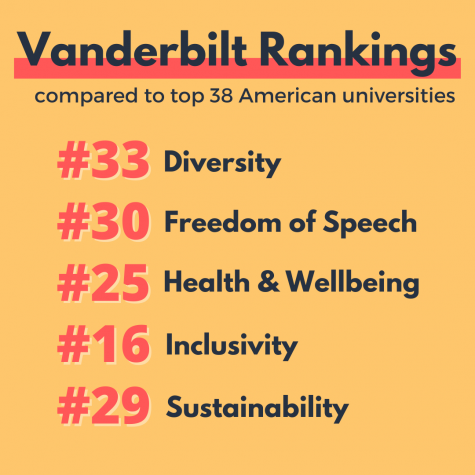
“The main area in which we gauged that Vanderbilt could improve is the Diversity metric (coming 33 on the list),” Thompson said in an email to The Hustler. “Areas of improvement would be in increasing the makeup of the student and staff ethnicity, and overall racial representation.”
The Office for Equity, Diversity and Inclusion did not respond to The Hustler’s request for comment about the university’s diversity ranking.
Charlie Rost, a sophomore member of Dores Divest, shared disappointment in the university regarding its sustainability ranking. He claimed that Vanderbilt’s environmentally-friendly efforts are often out of self-interest. Rost also drew attention to how Vanderbilt did not pursue a rating in 39 out of 63 applicable metrics, such as Sustainable Investments, on a March 2021 STARS report.
“Vanderbilt puts out plenty of sustainability-minded messages throughout the school year via email, social media, posters, and more (which is great!). But, if you explore a bit into these independent, research-based sustainability reports, you find that there actually isn’t much progress being made at the upper levels,” Rost said in a message to The Hustler. “Vanderbilt needs to be serious in practicing what they preach, and they can start by divesting fossil fuels.”
The Sustainability and Environmental Management Office did not respond to The Hustler’s request for comment about the university’s sustainability ranking.
Despite Vanderbilt ranking 30 out of 38 universities in the freedom of speech category, Bruns remarked on how the abundance of student organizations—the metric used in the study for this section—is her favorite part about Vanderbilt.
“My impression about freedom of speech at Vanderbilt has been a little bit more impacted by student’s attitudes and not so much by the attitude of administration, [but] I’ve always felt secure in saying what I want to say,” Bruns said.
In a July 27 interview with The Hustler, Provost and Vice Chancellor for Academic Affairs C. Cybele Raver spoke about freedom of expression, specifically relating to the movement in favor of Vanderbilt divesting from fossil fuels. She referred to the university as a “safe space” for members of the Vanderbilt community to exchange ideas and opinions.
“Currently, we have a great way of balancing the ability to speak one’s mind with the ability and the responsibility of maintaining community codes of civility and respect so that everyone has a sense of belonging,” Raver said. “Freedom of expression is important to recognize, but in the context of the complexity of the issue so that we can all learn how to exchange ideas and think through the complexity together.”
Kenny Moore, director of the David Williams II Recreation and Wellness Center, declined to comment about the university’s health and well-being rating. The Student Care Network did not respond to The Hustler’s request for comment about the university’s health and well-being ranking.
“I cannot confidently represent health and well-being for the entire campus support system,” Moore said in an email to The Hustler. “We are just one piece of the sophisticated puzzle.”
Thompson praised Vanderbilt’s inclusivity ranking (16) in an email to The Hustler.
“It is worth noting that Vanderbilt scored particularly high in the inclusivity category,” Thompson said. “This particular metric was important to the overall ranking as we believe that gaining a degree is an investment in a person’s future and should not depend [on] race, gender, identity, or socioeconomic background.”
The Office of Financial Aid and Scholarships declined to comment about the university’s inclusivity ranking.
Comparisons to peer institutions
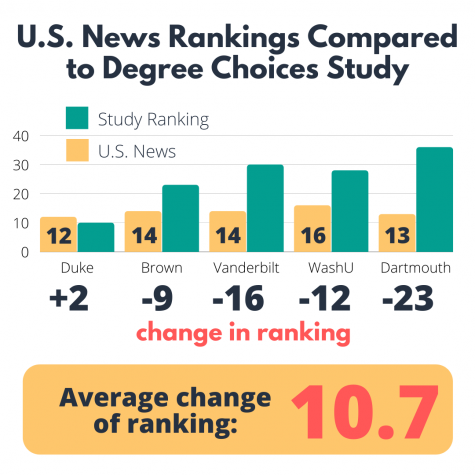
Based on the U.S. News list, Vanderbilt—No. 14—placed lower in overall progressivity than similarly ranked universities. Duke University (12) ranked 10 overall on the Degree Choices study. Brown University (tied at No. 14) placed 23 overall. Rice University and Washington University in St. Louis (WashU)—both tied at No. 16—ranked 16 and 28 in progressivity, respectively. Dartmouth College (13) was the exception to this trend, placing 36 in the study.
55 percent of the 33 universities included both in the study and the U.S. News list placed lower in the study, with an average decrease of 9.72 places.The average shift in ranking between the U.S News list and the Degree Choices study is 10.7 places. Vanderbilt dropped 16 spots, the second-largest decrease in the study after Dartmouth, which fell 23 spots.
Vanderbilt ranked one above the University of Texas at Austin (UT) and one below Amherst College in progressivity, with WashU and the University of Rochester at 28 and 32, respectively. However, Rochester and UT placed lower than Vanderbilt in the U.S. News list, with respective ranks of 34 and 42. Amherst is not included in the U.S. News ranking.











